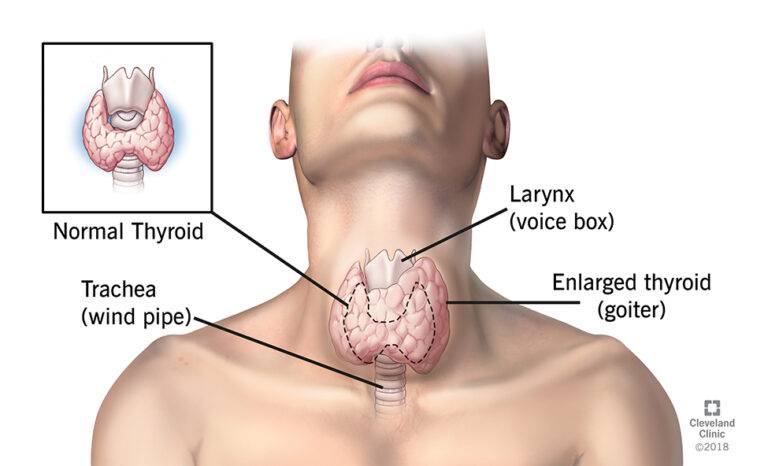Hyperthyroidism (overactive thyroid) Be Aware
Author: Giselle Robel
Giselle Robel
Category: Health
Tags: health, hyperthyroidism, body, thyroid
Hyperthyroidism, also called overactive thyroid, is a condition where the thyroid releases high levels of thyroid hormone in the body. And also, this condition can make your metabolism speed up. In addition, symptoms of hyperthyroidism include a rapid heartbeat, weight loss, increased appetite, and anxiety.

Hyperthyroidism (overactive thyroid) occurs when your thyroid gland produces too much of the hormone thyroxine. However, there are several treatments that are available for hyperthyroidism. Doctors use anti-thyroid medications and radioactive iodine to slow the production of thyroid hormones.
Sometimes, hyperthyroidism treatment involves surgery to remove all or part of your thyroid gland.
Although hyperthyroidism can be serious if you ignore it, most people respond well once hyperthyroidism is diagnosed and treated.
What is hyperthyroidism?
Hyperthyroidism is a condition where your thyroid creates and releases more hormones to your body than you need. The following are the main hormones that are made by the thyroid including triiodothyronine (T3) and thyroxine (T4). Having hyperthyroidism can impact your entire body. Picture something related to the word hyper. Most likely, you just thought of something that's fast or full of a lot of energy. When you have hyperthyroidism, the extra hormones can speed up your metabolism. Metabolism is the process that transforms the food you put in your body into energy that helps your body function. When you have hyperthyroidism, your metabolism is launched at high speed. This might cause you to feel your heart beating faster, experience anxiety and nervousness, and have an increased appetite.
Hyperthyroidism can affect your entire body and is a condition that needs to be treated by a healthcare provider.

What does my thyroid do?
Located at the front of your neck, the thyroid is a butterfly-shaped gland. Glands are organs that can be found all over your body. They create and release hormones substances that help your body function and grow. The thyroid gland plays a big part in many of your body's main functions. Your thyroid gland regulates your body temperature and controls your heart rate and metabolism.
When your thyroid gland is working correctly, your body is in balance and all of your systems function properly. If your thyroid stops working in the way it's meant to creating too much or too little thyroid hormones it can impact your entire body.
Symptoms
Hyperthyroidism can mimic other health problems, which can make it difficult for your doctor to diagnose. It can also cause a wide variety of signs and symptoms, including:
- Unintentional weight loss, even when your appetite and food intake stay the same or increase
- Rapid heartbeat (tachycardia) commonly more than 100 beats a minute
- Irregular heartbeat (arrhythmia)
- Pounding of your heart (palpitations)
- Increased appetite
- Nervousness, anxiety and irritability
- Tremor usually a fine trembling in your hands and fingers
- Sweating
- Changes in menstrual patterns
- Increased sensitivity to heat
- Changes in bowel patterns, especially more frequent bowel movements
- An enlarged thyroid gland (goiter), which may appear as a swelling at the base of your neck
- Fatigue, muscle weakness
- Difficulty sleeping
- Skin thinning
- Fine, brittle hair
Older adults are more likely to have either no signs or symptoms or subtle ones, such as an increased heart rate, heat intolerance, and a tendency to become tired during ordinary activities.
Graves’ ophthalmopathy

Sometimes an uncommon problem called Graves’ ophthalmopathy may affect your eyes, especially if you smoke. This disorder makes your eyeballs protrude beyond their normal protective orbits when the tissues and muscles behind your eyes swell. However, eye problems often improve without treatment.
Signs and symptoms of Graves’ ophthalmopathy include the following:
- Dry eyes
- Red or swollen eyes
- Excessive tearing or discomfort in one or both eyes
- Light sensitivity, blurry or double vision, inflammation, or reduced eye movement
- Protruding eyeballs
Who is most likely to get hyperthyroidism?
Both men and women can have hyperthyroidism. However, it's more commonly seen in women. Some factors that could increase your risk of developing hyperthyroidism can include the following:
- With a family history of thyroid disease.
- Having a medical history that includes conditions like anemia, type 1 diabetes and primary adrenal insufficiency (Addison's disease).
- Having a lot of iodine (a mineral that your body uses to make thyroid hormones) in your diet.
- Being over age 60.
- Being pregnant or having had a baby recently.
What causes hyperthyroidism?
There are several different medical conditions that can cause hyperthyroidism. These medical conditions can include the following:
- Graves' disease : In this disorder, your immune system attacks the thyroid. This makes the thyroid create too much thyroid hormone. Graves' disease is a hereditary condition. If a member of your family has Graves' disease, there's a chance others in the family could have it too. It's more common in women than men. Graves' disease is the most common cause of hyperthyroidism, making up about 85% of cases.
- Thyroid nodules : A thyroid nodule is a lump or growth of cells in the thyroid gland. The nodule is able to produce more hormones than your body needs. Such nodules are rarely cancerous.
- Thyroiditis : This is a general term that refers to swelling (inflammation) of your thyroid. This inflammation can be caused by an infection or a problem with your immune system. When the thyroid is inflamed, it can leak hormones, resulting in higher levels of hormones than your body needs. Thyroiditis can happen after the delivery of a baby (postpartum thyroiditis) or from taking drugs like interferon and amiodarone (a heart medication).
- Iodine: If you consume too much iodine (through your diet or medications), it can actually cause your thyroid to produce more thyroid hormone. Iodine is a mineral that your thyroid uses to create thyroid hormone.
Diagnose
Your healthcare provider will diagnose hyperthyroidism in several ways, including:
- A physical exam of your neck to see if the thyroid is larger than normal.
- Blood tests to look for high levels of thyroid hormone in your body.
- Imaging tests to look at your thyroid.
Physical Exam
During a physical exam, your healthcare provider will gently feel your neck to check the size of your thyroid gland. This is a simple and quick process that can be done in your provider's office. The provider will also examine the eyes, the heart, and the skin.
Blood Tests
Your healthcare provider may take a blood sample to look for high levels of thyroid hormone. This is called thyroid function testing. When you have hyperthyroidism, levels of the thyroid hormones T3 and T4 are above normal and thyroid-stimulating hormone (TSH) is lower than normal.
Additional Diagnosis
Imaging Tests
Taking a look at the thyroid can help to diagnose hyperthyroidism and the possible cause (often Graves' disease). Your provider could use a few tests to look at your thyroid. One test is called a thyroid scan and radioactive iodine uptake test. A thyroid scan uses small amounts of radioactive material to create images of your thyroid.
Another test is a thyroid ultrasound. An ultrasound is a non-invasive procedure that allows your provider to look at your thyroid on a screen.
Imaging tests allow your provider to get a sense of the size and shape of the thyroid, as well as if there are any thyroid nodules. The scan can tell your provider if the thyroid is overactive and making too much thyroid. Often, seeing an increased radioactive iodine uptake on this scan can help diagnose Graves' disease. If the thyroid is inflamed (swollen), it could be thyroiditis. In this case, there will be no radioactive iodine uptake in the neck.
Reasons for too much thyroxine (T4)
Normally, your thyroid releases the right amount of hormones, but sometimes it produces too much T4. This may occur for a number of reasons, including:
- Graves’ disease. Graves’ disease is an autoimmune disorder in which antibodies produced by your immune system stimulate your thyroid to produce too much T4. It’s the most common cause of hyperthyroidism.
- Hyperfunctioning thyroid nodules (toxic adenoma, toxic multinodular goiter or Plummer’s disease). This form of hyperthyroidism occurs when one or more adenomas of your thyroid produce too much T4. An adenoma is a part of the gland that has walled itself off from the rest of the gland, forming noncancerous (benign) lumps that may cause an enlargement of the thyroid.
- Thyroiditis. Sometimes your thyroid gland can become inflamed after pregnancy, due to an autoimmune condition or for unknown reasons. The inflammation can cause excess thyroid hormone stored in the gland to leak into your bloodstream. Some types of thyroiditis may cause pain, while others are painless.
Treatment
There are many treatment options for hyperthyroidism. Depending on the cause of your hyperthyroidism, some options may be better for you over the long term.
Treatment options for hyperthyroidism can include:
- Anti-thyroid drugs methimazole (Tapazole) or propylthioracil (PTU): These drugs block the ability of the thyroid to make hormones. They offer rapid control of your thyroid.
- Radioactive iodine : Radioactive iodine is taken by mouth and absorbed by the overactive thyroid cells. The radioactive iodine damages, these cells, and causes your thyroid to shrink and thyroid hormone levels to go down over a few weeks. This usually leads to permanent destruction of the thyroid, which will cure hyperthyroidism. Most patients who receive this treatment have to take thyroid hormone drugs for the rest of their lives to maintain normal hormone levels.
- Surgery : Your healthcare provider may remove the thyroid gland through surgery (thyroidectomy). This will correct your hyperthyroidism, but it will usually cause hypothyroidism (an underactive thyroid). Patients who have a thyroidectomy have to take thyroid supplements to keep hormone levels normal.
- Beta blockers : These drugs block the action of thyroid hormones on the body.
How long does it take to treat hyperthyroidism?
The amount of time it takes to treat hyperthyroidism can change depending on what caused the condition. If your healthcare provider treats your condition with anti-thyroid medications (methimazole or propylthioracil) your hormone levels should drop to a controllable level in about six to 12 weeks. Your healthcare provider may decide to give you high doses of iodine drops (not radioactive) which would normalize thyroid levels in seven to 10 days. However, this is a short-term solution and you will most likely need a more permanent solution like surgery. Though you may need to wait for a period of time to be scheduled for thyroid surgery (thyroidectomy), this is a very effective and definitive way to treat hyperthyroidism. It's considered a permanent solution for hyperthyroidism.
Are there any risks to hyperthyroidism treatments?
With most treatments, there are also risks of side effects. It's important to talk to your healthcare provider and weigh all of the pros and cons before deciding on a treatment plan. Some of these risks include:
- Medication side effects – Medications that can be used to treat hyperthyroidism are methimazole and propylthioracil. These drugs can cause several side effects. One side effect is potential liver damage. This can happen to people of any age. In pregnant women, this medication can pass from mom to the baby through the placenta. And also, this could cause hypothyroidism or the development of a goiter in the unborn baby.
- Radioactive mat erial – There's a possible side effect of cancer. Currently, there's no link between using radioactive iodine to treat hyperthyroidism and developing cancer. Women shouldn't take radioactive iodine while pregnant or breastfeeding because it can affect the baby's thyroid glands. Sometimes, you can lose sensation in your mouth after radioactive iodine (RAI) therapy. This is actually common.
- Surgery – Surgery is generally considered a very effective treatment for hyperthyroidism. In rare situations, complications like paralysis of the vocal cords (inability to speak) and damage to your parathyroid glands can happen, which results in low calcium in the blood.
After treatment, you will most probably need to take replacement thyroid hormone for the rest of your life. This is because some of these treatments - especially surgery - reduce your thyroid hormone levels to very low levels or eliminate this hormone by removing your thyroid. Consequently, you'll need to re-introduce the thyroid hormones back into your system by taking regular medication.
Risk factors
Risk factors for hyperthyroidism, include:
- A family history, particularly of Graves’ disease
- Female sex
- A personal history of certain chronic illnesses, such as type 1 diabetes, pernicious anemia and primary adrenal insufficiency
Complications
Hyperthyroidism can lead to a number of complications:
- Heart problems. Some of the most serious complications of hyperthyroidism involve the heart. Thus, include a rapid heart rate, a heart rhythm disorder called atrial fibrillation that increases your risk of stroke, and congestive heart failure a condition in which your heart can’t circulate enough blood to meet your body’s needs.
- Brittle bones. Untreated hyperthyroidism can also lead to weak, brittle bones (osteoporosis). Moreover, too much thyroid hormone interferes with your body’s ability to incorporate calcium into your bones.
- Eye problems. People with Graves’ ophthalmopathy develop eye problems, including bulging, red or swollen eyes, sensitivity to light, and blurring or double vision. Furthermore, untreated, severe eye problems can lead to vision loss.
- Red, swollen skin. In rare cases, people with Graves’ disease develop Graves’ dermopathy. This affects the skin, causing redness and swelling, often on the shins and feet.
- Thyrotoxic crisis. Hyperthyroidism also places you at risk of thyrotoxic crisis a sudden intensification of your symptoms, leading to a fever, a rapid pulse and even delirium. Therefore, if this occurs, you must seek immediate medical care.













